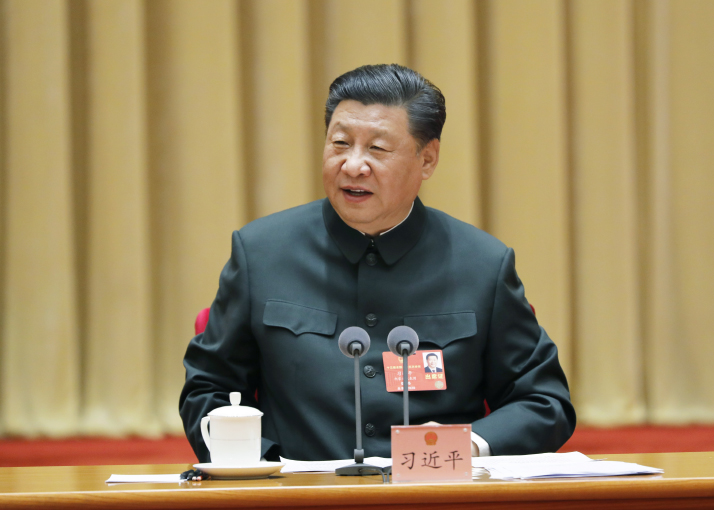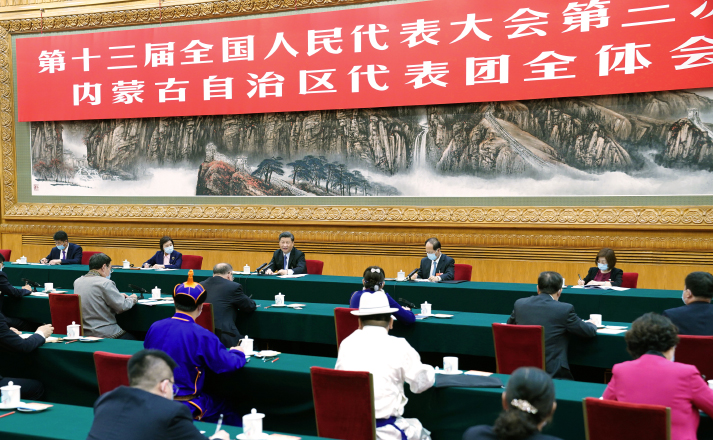| Opinion |
| President Xi Jinping outlines priorities of national governance | |
| 'People,' 'economy,' 'public health system' and 'national defense and the military'—these are the key topics emphasized by President Xi Jinping, also General Secretary of the Central Committee of the Communist Party of China (CPC) and Chairman of the Central Military Commission, during this year's Two Sessions—the annual sessions of the National People's Congress (NPC), the top legislature, and the National Committee of the Chinese People's Political Consultative Conference (CPPCC), the top political advisory body | |
|
|
 President Xi Jinping speaks at a plenary meeting of the delegation of the People's Liberation Army and People's Armed Police Force during the Third Session of the 13th NPC in Beijing on May 26 (XINHUA)
"People," "economy," "public health system" and "national defense and the military"—these were the key topics emphasized by President Xi Jinping, also General Secretary of the Central Committee of the Communist Party of China (CPC) and Chairman of the Central Military Commission, during this year's Two Sessions—the annual sessions of the National People's Congress (NPC), the top legislature, and the National Committee of the Chinese People's Political Consultative Conference (CPPCC), the top political advisory body. Xi discussed these topics while participating in meetings of lawmakers and political advisers. During the Two Sessions every year, Xi joins the discussions of NPC deputies and CPPCC National Committee members. His remarks provide guidance for the government's work and exemplify his thoughts on national governance. People-centered philosophy On the first day of the annual legislative session on May 22, Xi met deputies from Inner Mongolia Autonomous Region in north China. Last year, he focused on ecological protection at the meeting with deputies from the region; this year, he emphasized people. Serving the people is the governance concept of the CPC. Xi has elaborated on the "people first" concept on multiple occasions. The reiteration of the approach this time was due to both the domestic and international situations. Internationally, U.S. politicians such as Secretary of State Michael Pompeo have been trying to sow discord between the CPC and the people. Therefore it is especially important to reaffirm the Party's commitment to keeping a strong bond with the people. Domestically, the CPC has led the Chinese people to work in concert to fight the novel coronavirus disease (COVID-19) outbreak. The people theme showed respect for them.Xi said, "The Party has no special interests of its own but always puts the people's interests first. This is the prominent characteristic of our Party as a Marxist party." He stressed that people are the main source of confidence for the Party and the fundamental goal for the Party to unite and lead the people in revolution, development and reform is to ensure a better life for them. "The CPC will never waver in pursuing this goal," he said. Xi's people-centric philosophy has been manifest in this year's COVID-19 prevention and control. After the outbreak of the epidemic, he personally oversaw and directed the response from the very beginning, stating clearly that people's life and health should be made the top priority. "We are willing to protect people's life and health at all costs," Xi said. "We mobilized from around the nation the best doctors, the most advanced equipment and the most needed resources to Hubei and Wuhan, going all out to save lives." Hubei Province in central China, with Wuhan as its capital, was hardest hit by the coronavirus, accounting for the vast majority of infections and casualties in the country. Under the unified leadership of the CPC Central Committee, the whole country has participated in the fight against COVID-19. They followed epidemic control plans in a strict manner and became the fundamental strength in the combat.  President Xi Jinping joins a panel discussion with NPC deputies from Inner Mongolia Autonomous Region in north China, in Beijing on May 22 (XINHUA)
Economic prospect China aims to become a moderately prosperous society in all respects and eradicate absolute poverty in 2020. This year also marks the end of the 13th Five-Year Plan (2016-20). But the epidemic has significantly disrupted the Chinese economy, with economic growth in the first quarter down 6.8 percent year on year. Although production and work have resumed and economic activities have rebooted now, there are still many uncertainties. Therefore this year's Report on the Work of the Government set no specific target for economic growth. On May 23, Xi attended a meeting of political advisers from the economic sector. He called for analyzing the domestic economic situation from a comprehensive, dialectical and long-term perspective, urging efforts to foster new opportunities amid challenges and make new advancements amid changes. Focus should be put on leveraging China's potential and role as the world's largest market, clarifying the strategic direction of supply-side structural reform, and consolidating the basic trend of steady economic growth with a sound momentum in the long term, he said. Xi underlined the importance of enhancing the fundamental status of agriculture, ensuring stability and security in areas essential to people's livelihood and social and economic development, and accomplishing the targets and tasks of completing building a moderately prosperous society in all respects and winning the battle against poverty. China's economy is in a pivotal stage for transforming the growth model, improving the industrial structure, and fostering new growth drivers, Xi said, adding that the economic operation now faces relatively heavy downward pressure due to difficulties and challenges caused by intertwined structural, institutional and cyclical problems, which have been compounded by the COVID-19 outbreak. Despite rising instability and uncertainties in the world, Xi pointed out that China's economy is still characterized by ample potential, strong resilience, ample maneuvering room and sufficient policy instruments. China has the largest industrial system in the world with the most complete categories, strong production capabilities, complete supporting sectors, as well as over 100 million market entities and a talent pool of 170 million people, Xi said. It also has a super-large domestic market of 1.4 billion people and massive potential in investment demand. Moreover, Xi highlighted the significant role of new growth areas and drivers such as the digital economy, intelligent manufacturing, industries related to life and health, new materials and other strategic emerging industries. In addition to domestic pressure, China also faces an anti-globalization sentiment, protectionism, unilateralism and rising geopolitical risks abroad. Xi called for unwavering efforts to make economic globalization more open, inclusive and balanced so that its benefits are shared by all, and to build an open world economy. His remarks demonstrated China's firm resolve to further reform and opening up and champion globalization. Public health Xi stressed fortifying the public health protection network at a panel discussion with lawmakers from Hubei on May 25. China being a country of over 1.4 billion people, safeguarding public health security, preventing major public health crises and protecting people's health and safety is a responsibility that allows no relaxation, he said. Though the public health and medical service systems played key roles in dealing with the epidemic, he admitted that some weak links and inadequacies were also exposed, urging prompt efforts to fix them. He also listed the priorities for improvement including reforming the disease prevention and control system; boosting epidemic monitoring, early warning and emergency response capacity; perfecting the treatment system for major epidemics; and amending public health emergency laws and regulations. Military preparedness Although the COVID-19 epidemic response is a not a wartime military action, it has been a test for the Chinese armed forces' capacity. Over 10,000 medical workers from the military were dispatched to Hubei to treat the infected. Xi spoke highly of their contributions to the fight at a plenary meeting of the delegation of the People's Liberation Army and People's Armed Police Force on May 26. He said the epidemic has profoundly impacted China's security and development and directed the military to think about worst-case scenarios and scale up training and battle preparedness. He urged them to be ready to promptly and effectively deal with all sorts of complex situations and safeguard national sovereignty, security and development interests. (Print Edition Title: Hign on the Agenda) Copyedited by Sudeshna Sarkar Comments to lanxinzhen@bjreview.com |
|
||||||||||||||||||||||||||||||
|
